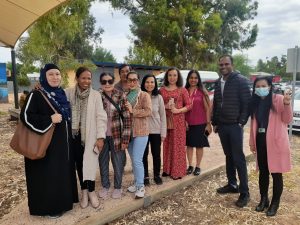Marvellous multicultural Mildura
With about eighty different nationalities present in the community, Mildura has quietly become one of Australia’s most multicultural regional cities.
Founded by American irrigators and populated by successive waves of Greeks, Italians, Turks and Croatians before and just after WWII, Mildura has always been a melting pot.
But more recently refugees from Africa, Afghanistan, Burma and the Middle East have made the sundrenched city on the Murray their home.
Refugees are now being settled in Mildura almost every week and growing numbers of migrants are also arriving, attracted by the employment opportunities, the relaxed lifestyle and the social and cultural infrastructure.
 The Executive Officer of the Sunraysia Mallee Ethnic Communities Council Akesa Kei says multiculturalism is a vital part of the ongoing growth of Mildura and the Sunraysia/Mallee region at large.
The Executive Officer of the Sunraysia Mallee Ethnic Communities Council Akesa Kei says multiculturalism is a vital part of the ongoing growth of Mildura and the Sunraysia/Mallee region at large.
“Mildura’s hospitality industry is a great representation of the diverse community that we have and the seasonal workers we welcome have had a significant impact on the region’s economy,” Me Kei said.
“The region has come a long way in terms of inclusion in areas such as education, health services, community engagement and employment that all play an integral part to social cohesion irrespective of residential status.
“But I think there is always room for improvement and we are continuously learning as a community to embrace our diversity in ways that allow us all to live and work harmoniously,” Ms Kei said.
At a recent Harmony Day event, Mayor of Mildura Liam Wood said multiculturalism was the “heartbeat of the community”.
“We in Mildura welcome everyone, no matter where they are from or what their religion is. Everyone is welcome here and everyone is respected and valued,” he said.
Recently, Mildura Rural City Council, refugee and migrant settlement agency AMES Australia Council and the Sunraysia Mallee Ethnic Communities Council launched a Multicultural Support Network for the Mildura region.
In addition to community dinners, the network partners local community members with newly arrived refugees to provide support as they settle in the community.
Former mayor of Mildura and local lawyer Peter Byrne is also a former chair of SMECC.
He says diversity has made the city a better place.
“If you want to be hard headed about the value of the settlement of new migrants and refugees here, you could say that it brought millions of extra dollars to the town’s economy,” Peter said.
“But I think that the real value is in the fact that it has made Mildura a more interesting place to live.
“I was born here in Mildura and when I was growing up the biggest divisions were religious – between Catholics and Protestants. Now, those divisions are all gone thank goodness,” he said.
Peter says the acceptance of diversity has become a key characteristic of the Mildura community.
One story Peter relishes relating to anyone who will listen underlines his passion for the remarkable transformation that has seen his town become the most culturally diverse regional city in Australia.
“We had a multicultural day down on the river last year,” Peter recalled.
“I gave a speech to the assembled masses there and I said ‘if you really want to make someone’s day, go up to a person who is a newcomer to Australia and say ‘hello’ and smile’,” he said.
“When I finished speaking I wandered around and I realised I wasn’t taking my own advice and was walking around looking rather glum.
“So, I went up to an African woman with three kids aged about ten, six and four; and introduced myself to her. We had a conversation with her daughter interpreting as she couldn’t speak much English.
“She thanked me for my kind words in the speech I had given and I asked her where she was from.
“Her daughter explained the question to the woman, and received her mother’s response.
“The little girl then turned to me and said in a broad Australian accent: “Mum says to tell you we are from South Mildura’,” Peter said.
“I had been working with refugees for some time but that’s when it really hit me that the woman and her family now considered Mildura their home; they had settled here and they felt they belonged here.
“I never found out where she was from in Africa but I didn’t need to. I felt what she said spoke volumes,” he said.
“We’re settling refugees every week or so, other people by way of internal migration are coming to join other community members here and slowly but surely we are becoming a real multicultural melting pot and the rival of much larger cosmopolitan cities.
“It’s palpably obvious that our diversity has made for stronger community; it has made for a more caring community; and, it has made for a culturally richer community,” Peter said.












